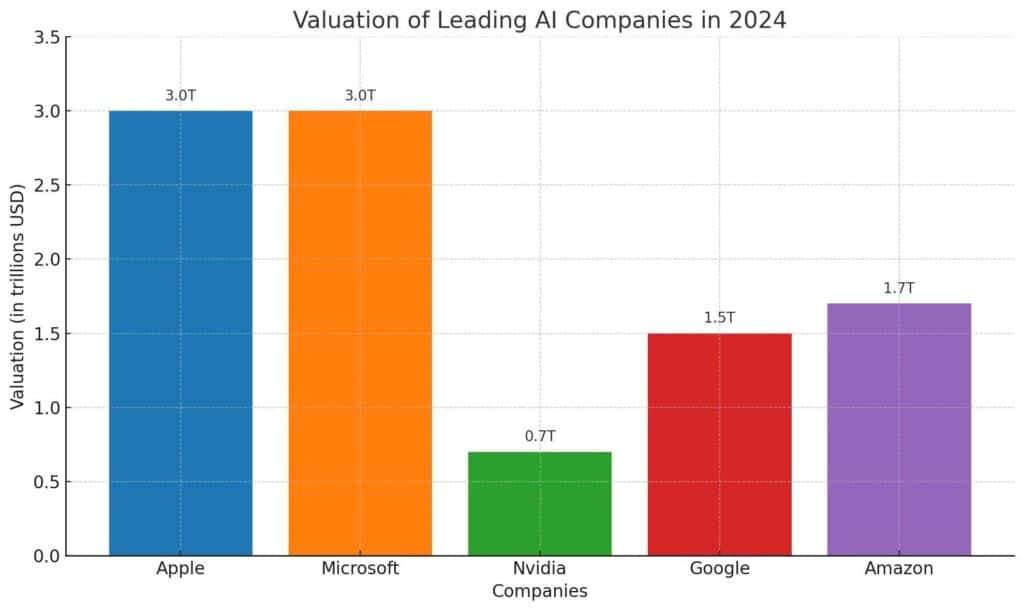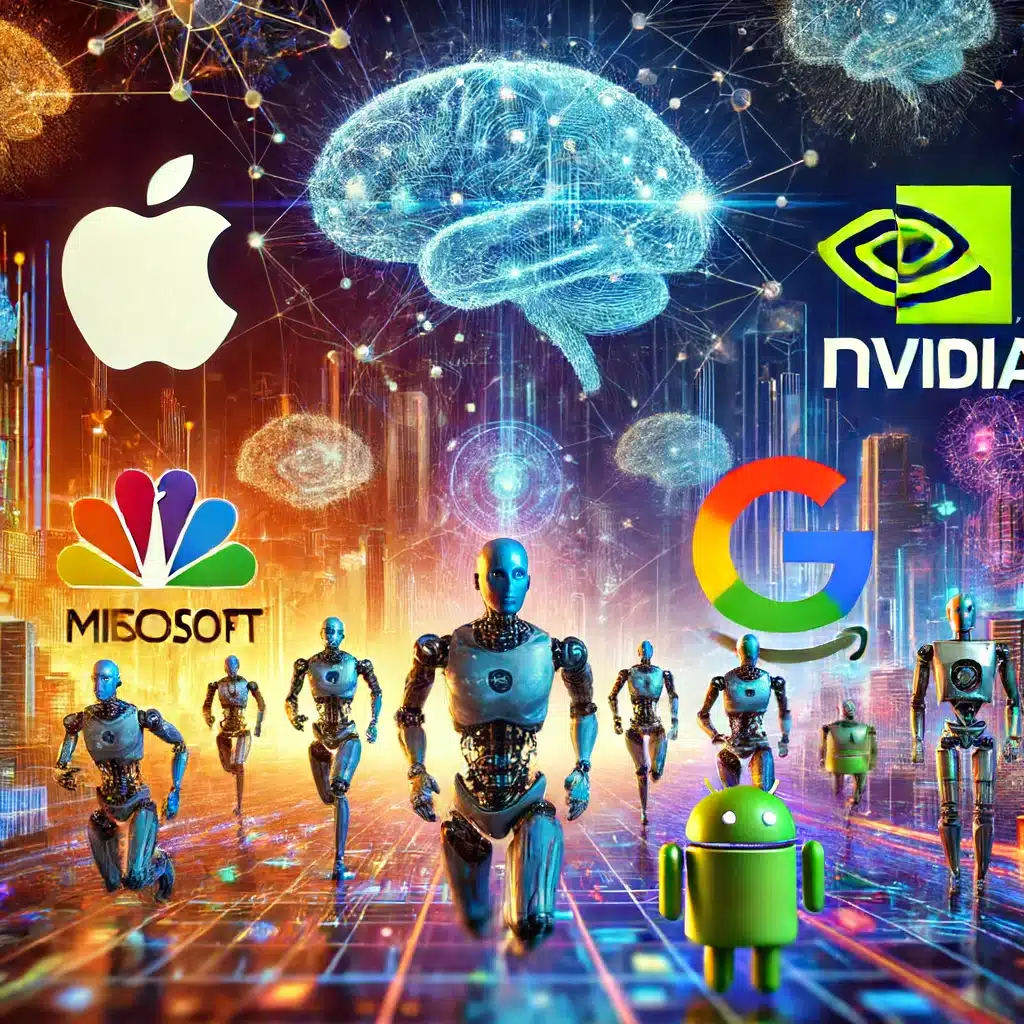
Approx. read time: 8.1 min.
Post: The AI Showdown: Unveiling the Strategies of Apple, Microsoft, Nvidia, Google, and More
The Battle for AI Supremacy: Apple, Microsoft, Nvidia, Google, and Beyond
Introduction
The AI market has become a battleground for tech giants like Apple, Microsoft, Nvidia, and Google. Each company brings unique strengths and strategies to the table, vying for dominance in an industry poised to revolutionize everything from healthcare to entertainment. This article delves into the past achievements, current projects, and future plans of these key players, exploring their market dominance and valuations.
Apple
Past Achievements
Apple has historically kept its AI initiatives under wraps, focusing on integrating AI subtly into its products. The most notable examples include Siri, the iPhone’s virtual assistant, and various machine learning features in its operating systems and hardware. Siri, launched in 2011, was one of the first mainstream virtual assistants and set the stage for future developments in voice-activated technology. Additionally, Apple has incorporated machine learning into features like facial recognition for security and photo organization.
Apple’s approach to AI has always been user-centric, aiming to enhance the overall user experience. For example, the company’s Core ML framework allows developers to integrate machine learning models into apps, enabling features such as image recognition and natural language processing. This seamless integration has made AI a fundamental part of the Apple ecosystem without overtly marketing it as a primary feature.
Current Projects
Apple’s focus on AI has intensified in recent years. The company is heavily investing in generative AI technologies, aiming to enhance user experience across its ecosystem. For instance, iOS 18 is expected to feature “Apple Intelligence,” a suite of AI-driven tools designed to personalize user interactions with devices. These include advanced photo editing, custom emojis, smart content summaries in Safari, and new coding features in Xcode.
Moreover, Apple’s development of the M1 and M2 chips with integrated Neural Engines signifies a significant leap in on-device AI processing. These chips allow for real-time language translation, improved camera functionalities, and better battery life through intelligent power management. The introduction of Apple Silicon in Mac computers has further cemented Apple’s commitment to advancing AI hardware capabilities.
Future Plans
Apple plans to further integrate AI across its product line, including enhancements to Siri and new features in its operating systems. The company is also rumored to be developing its own generative AI models, potentially to rival the capabilities of OpenAI’s ChatGPT. Apple’s significant investment in AI startups, including a projected $4.75 billion expenditure by 2024, underscores its commitment to leading in AI innovation [MacRumors].
Future developments may include AI-driven health applications that leverage the data from Apple’s Health app and Apple Watch. By integrating AI with health data, Apple could provide more accurate health monitoring and predictive analytics, enhancing preventive care and personalized treatment plans. Additionally, advancements in AR (augmented reality) through AI could revolutionize user interaction with devices, offering more immersive and intuitive experiences.
Microsoft
Past Achievements
Microsoft has been a pioneer in AI through its Azure cloud platform, which offers various AI services such as machine learning, cognitive services, and bot services. The company’s acquisition of OpenAI and subsequent integration of GPT-3 into its products has marked a significant milestone in the AI landscape. Microsoft’s AI capabilities are embedded in many of its products, including the Windows operating system, Office 365, and its gaming platforms.
One of Microsoft’s early successes in AI was the development of the Cortana virtual assistant. Although Cortana did not achieve the same level of success as Siri or Alexa, it demonstrated Microsoft’s commitment to integrating AI into its ecosystem. Additionally, the company’s AI for Earth initiative uses AI to tackle environmental challenges, showcasing the potential for AI to contribute to global sustainability efforts.
Current Projects
Microsoft is currently focused on embedding AI deeply into its enterprise solutions. This includes using AI to enhance productivity tools like Microsoft Office and Dynamics 365. Additionally, the company is developing AI solutions for industries such as healthcare, finance, and retail, leveraging Azure’s robust AI capabilities. The integration of AI into Microsoft Teams, for instance, has improved virtual meeting experiences through features like real-time transcription and translation.
Azure’s AI capabilities extend to advanced machine learning services, including Azure Machine Learning, which helps data scientists and developers build, train, and deploy machine learning models more efficiently. Microsoft’s Project Brainwave, an initiative for deep learning acceleration, offers real-time AI inference, making it possible to process AI tasks at unprecedented speeds.
Future Plans
Microsoft plans to continue its AI advancements by integrating more sophisticated models and expanding its AI services portfolio. The company’s vision includes making AI accessible to all businesses, thereby democratizing AI technology and fostering innovation across various sectors. Microsoft is also exploring AI ethics and governance, aiming to ensure responsible and inclusive AI development.
Looking ahead, Microsoft aims to integrate AI into more aspects of everyday life through its HoloLens and mixed reality initiatives. The potential for AI in these areas includes advanced object recognition and interaction, enabling more intuitive and immersive mixed reality experiences. Microsoft’s commitment to AI-driven cybersecurity solutions also highlights the growing importance of AI in protecting digital infrastructure against sophisticated threats.
Nvidia
Past Achievements
Nvidia’s contributions to the AI field have been instrumental, primarily through its powerful GPUs that enable deep learning and complex computations. The company has developed the CUDA platform, which has become a cornerstone for AI research and development. Nvidia’s GPUs are widely used in AI training and inference, supporting advancements in various AI applications.
Nvidia’s role in AI extends beyond hardware; the company has also been a pioneer in software development for AI research. The Nvidia Deep Learning AI (NVDIA) suite provides tools and frameworks for building, training, and deploying AI models, making it easier for researchers and developers to harness the power of AI.
Current Projects
Nvidia is advancing AI through its work on AI supercomputers and platforms like Nvidia DGX. These systems are designed to accelerate AI training and inference, making them invaluable for enterprises and researchers. The company is also working on AI-driven solutions for autonomous vehicles and robotics, showcasing the versatility of its AI capabilities. Nvidia’s DRIVE platform is a leading solution for developing and deploying autonomous vehicles, integrating AI to enhance safety and efficiency.
Additionally, Nvidia’s Omniverse platform allows for collaborative 3D design and simulation, powered by AI. This platform enables creators to build and interact in virtual worlds, offering unprecedented opportunities for innovation in industries like entertainment, architecture, and engineering.
Future Plans
Nvidia’s future in AI looks promising with its continued investment in next-generation GPUs and AI software. The company aims to expand its influence in various AI-driven industries, including healthcare, automotive, and cloud computing. Nvidia’s commitment to pushing the boundaries of AI technology positions it as a crucial player in the AI market. The development of the Nvidia Omniverse, a platform for simulating and collaborating in virtual environments, highlights the company’s innovative approach to leveraging AI.
Future advancements may see Nvidia playing a pivotal role in the development of quantum computing. By combining AI with quantum computing, Nvidia could potentially solve complex problems that are currently beyond the reach of classical computers. This could lead to breakthroughs in fields such as materials science, cryptography, and drug discovery.
Past Achievements
Google has been at the forefront of AI innovation, with notable achievements like the development of TensorFlow, an open-source machine learning framework, and the creation of AI models like BERT and GPT-3. Google’s AI prowess is evident in products like Google Assistant and its search algorithms. TensorFlow has become a standard tool for AI development, used by researchers and developers worldwide.
Google’s DeepMind subsidiary has also made significant contributions to AI research, with achievements such as AlphaGo, the AI system that defeated world champions in the game of Go. This milestone demonstrated the potential of AI to master complex tasks and has spurred further research into AI applications.
Current Projects
Google is heavily investing in AI to improve its core services, including search, advertising, and cloud computing. The company is developing AI tools to enhance productivity in Google Workspace and exploring AI-driven healthcare solutions through its subsidiary, DeepMind. Google’s AI research continues to push the envelope, with projects aimed at improving natural language processing and computer vision. The use of AI in Google Photos for automatic photo tagging and organization is a testament to the practical applications of Google’s AI technology.
Moreover, Google is leveraging AI to enhance its advertising algorithms, ensuring more accurate targeting and improved return on investment for advertisers. In healthcare, Google’s DeepMind is working on AI models that can predict patient deterioration and improve diagnostic accuracy, potentially revolutionizing patient care.
Future Plans
Google’s future AI plans include expanding its AI capabilities across all its products and services. The company is focused on creating more personalized and intelligent user experiences, leveraging its vast data resources and AI expertise. Google’s commitment to ethical AI development also plays a crucial role in its long-term strategy, ensuring that its AI advancements benefit society at large. Initiatives like Google Health are exploring how AI can revolutionize healthcare through improved diagnostics and personalized treatments.
Looking forward, Google aims to integrate AI more deeply into its cloud services, offering enhanced machine learning tools and platforms for businesses. The development of more advanced natural language processing models could lead to significant improvements in Google Assistant and other AI-driven services. Additionally, Google’s exploration of AI in climate change research underscores its commitment to using AI for global good.
Other Important Players
Amazon
Amazon has emerged as a significant player in the AI market through its AWS cloud platform, which offers a wide range of AI and machine learning services. Amazon’s AI efforts are also evident in its smart home devices, like Alexa










